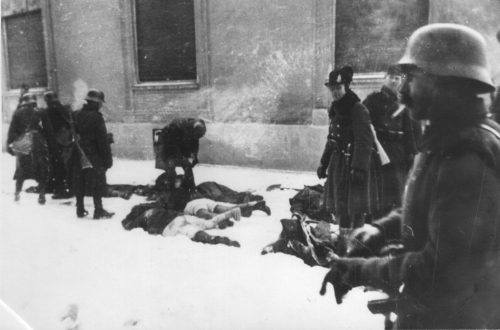Cross-posted from Eva S. Balogh at Hungarian Spectrum
The following letter was sent to the United States Holocaust Museum in Washington, the Mémorial de la Shoah in Paris, the Stiftung Denkmal für die ermordeten Juden Europas in Berlin, and the Yad Vashem in Jerusalem. The signatories, as you can see, are from all over the world.
The memorial the current Hungarian government, despite months of protests, intends to erect is an important issue because it symbolizes a revisionist interpretation of the Hungarian Holocaust that is inadmissible. Let me express my hope that international public opinion will be able to prevent the erection of a monument that not only the Hungarian Jewish community but approximately half of the country’s population disapproves of.
* * *
We, the undersigned, ask the United States Holocaust Memorial Museum in Washington, the Mémorial de la Shoah in Paris, the Stiftung Denkmal für die ermordeten Juden Europas in Berlin and the Yad Vashem in Jerusalem to help safeguard the historical memory of the destruction of the Hungarian Jews.
The Hungarian government, with deep contempt for historical truth, persists in creating an alternative vision, which denies the responsibility of the Hungarian government and of those Hungarians who had facilitated, or participated in the murders during the Second World War.
We are deeply concerned about the attempt by the government’s Veritas institute (charged with rewriting the past from a nationalist perspective), to sign an agreement with the Holocaust Memorial Center at Páva Street, Budapest, and about the current insecure situation in which the Holocaust Memorial Center finds itself, without director. The director of Veritas consistently uses terminology once employed by the regime of Regent Miklós Horthy which had engineered the murder of the Hungarian victims of the Holocaust. This rhetoric, in line with government ideology, exculpates the Hungarian government of the period.
We are deeply concerned about the falsification of the past, and fear that there will no longer be a public institution in Hungary that will be able to work unhindered on the history of the Holocaust. There are now several operational or planned museums in Budapest that provide a historically inaccurate, distorted version of the past (The House of Terror Museum, the planned House of Fates, and the possible new conception for the Holocaust Memorial Center). The trend is towards minimizing the Holocaust and shifting the blame onto both Nazis and communists who are widely equated with Jews. We would like to ensure that the truth is available to the public in an independent museum or virtual museum.
We also ask that you support those in Hungary who oppose the government memorial that is being erected in Budapest to commemorate Hungary’s “German occupation” on 19 March 1944. The monument blurs the lines between victims and culprits by representing Hungary, or in recent governmental reinterpretation, “all the victims” of the occupation, in the figure of the Archangel Gabriel, while shifting all the responsibility onto German Nazis represented by an eagle.
The list of signatories appears below.
Christopher Adam, Historian, Carleton University, Canada
Eszter Andor, Remembrance Coordinator, Canada
Attila Ara-Kovács, Former Diplomat, Journalist, Hungary
Anna Balint, Independent Critic, Writer, Curator, Hungary
Zsófia Balla, Poet, Hungary
Eva S. Balogh, Historian, USA
Péter Bányai, Political Analyst, Romania
Anna Bayer, Human Rights Activist, USA
Nora Berend, Cambridge University, UK
Zsuzsa Berend, Sociologist, UCLA, USA
Gábor Betegh, Head of Department, Department of Philosophy, Central European University,
Hungary
László Bitó, Writer, Hungary
Randolph Braham, City University of New York, USA
Holly Case, Associate Professor, Cornell University, USA
Victor Caston, Professor of Philosophy and Classical Studies, University of Michigan, USA
Isabelle Cochelin, University of Toronto, Canada
Esther Cohen, Hebrew University, Israel
Vilmos Csányi, Ethologist, Researcher, Professor,
Vilmos Csaplár, Writer, Hungary
Erika Csontos, Editor, Hungary
Istvan Deak Columbia University USA
Gábor Demszky, Former Mayor of Budapest, Woodrow Wilson Center, Hungary
Matyas Eorsi, Hungary
Robert Evans, Regius professor of History emeritus, Oxford University, UK
Borbala Farago, Professor, Researcher, Ireland
Gabriella Fekete, Psychologist, Hungary
Luc Ferrier, Groupe d’Anthropologie scolastique, Ecole des Hautes Etudes en Sciences Sociales, France
Roy Flechner, Lecturer in Early Medieval History, University College Dublin, Ireland
Tamás Fodor, Actor, Director, Hungary
Tibor Frank, Economist, Businessman, Urban Innovative Solutions, Inc. (UIS), Canada
Anna Fried, Canada
Laszlo Fried, Canada
Kinga Frojimovics, Historian, Archivist, Hungary
Zoltán Gendler Szabó, Professor of Philosophy, Yale University, USA
Susan Glanz, Professor, St. John’s University, USA
Peter Godman, Professor, Monumenta Germaniae Historica (MGH), Germany
András B. Göllner, Concordia University, Canada
Nadia Gorman, Dartmouth College, USA
Gábor Halmai, Professor of Law; Visiting Research Schollar, ELTE; Princeton University, USA
Miklós Haraszti, UN Special Rapporteur on the situation of human rights in Belarus, Hungary
Roza Hodosan, Sociologist, Hungary
Ágnes Horváth, Professor of French Studies, ELTE BTK – Faculty of Philology, Hungary
Eva Illouz, Hebrew University, Israel
László Karsai, Szegedi Tudományegyetem/University of Szeged, Hungary
R. A. Kaster, Professor of Classics, Princeton University, USA
Erika Kiss, Associate Research Scholar, Director of Film Forum, Princeton University, USA
Géza Komoróczy, Professor Emeritus, Eötvös Loránd University, Hungary
Éva Kovács, Sociologist, Hungary/Austria
Péter Kovács, Art Historian, Hungary
Mária M. Kovács, Central European University, Hungary
János M. Kovács, Economist
Júlia Lázár, Writer, Teacher, Translator, Hungary
Paul Lerner, Associate Professor of History, Director, Max Kade Institute for Austrian-German- Swiss Studies, University of Southern California, USA
Balint Magyar, Sociologist, Hungary
Michael Marrus, Professor of History, University of Toronto, Canada
Stephen Menn, Professor of Ancient and Contemporary Philosophy, Humboldt-Universität zu Berlin, Germany
Andras Mink, Archivist, Historian, OSA Archivum, Hungary
András Mohácsi, Artist (képzőművész), Hungary
Judit Molnár, Szegedi Tudományegyetem/University of Szeged, Hungary
Piroska Nagy, Université du Québec à Montréal, Canada
Zsuzsanna Ozsvath, Leah and Paul Lewis Chair of Holocaust Studies, University of Texas at Dallas, USA
David Patterson, Hillel Feinberg Chair in Holocaust Studies, University of Texas at Dallas, USA
Anna Perczel, Architect, Hungary
Anna Porter, Writer and Publisher, Canada
Jeffrey Prager, Professor of Sociology, UCLA, USA
László Rajk, Architect, Hungary
Ruben A. S. Rein, Merchant, Techdec Informatica, Brazil
Jeannie Rifkin, Cosmetics Consultant,
Kim Lane Scheppele, Princeton University, USA
Tamas St.Auby, Artist, Hungary
Gisela Striker, Walter C. Klein Professor of Philosophy and of the Classics, Emerita, Harvard University, USA
Judith Szapor, Assistant Professor, McGill University, Canada
Júlia Szilágyi, Writer, Romania
Sándor Szilágyi, Writer on Photography, Hungary
Mihály Szilágyi-Gál, Philosopher, ELTE, Hungary
Gáspár Miklós Tamás, Hungary
Jozef A. Tillman, Artist, Hungary
Tamas Ungvari, Professor Emeritus,
Judith Vince, Hungary
Judy Young, Holocaust Survivor, Canada
Talia Zajac, University of Toronto, Canada
Froma I. Zeitlin, Emerita, Ewing Professor of Greek Language & Literature, Professor of Comparative Literature, Princeton University, USA
(Hat tip: Karl Pfeifer)


